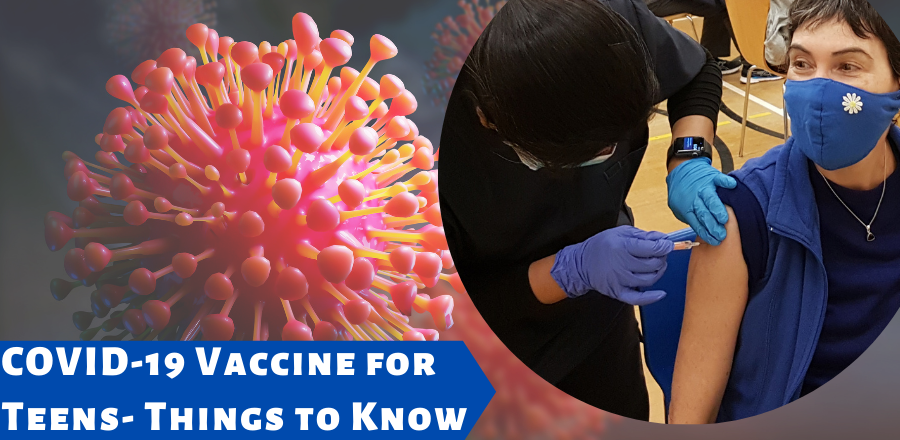In a world struck with a deadly pandemic, vaccination seems like a blessing. Interestingly, all the people in the US don’t agree. Some people prefer not to get vaccinated, while some prefer to get themselves and their loved ones vaccinated as soon as they can.
Teenagers are quite vulnerable to the COVID-19 disease, and it can prove to be deadly for them. Sometimes, teenagers don’t or can’t get vaccinated because their parents don’t believe in the vaccine. In such a situation, the question arises. Do teenagers in the US have the right to be vaccinated against their parents’ will? Sadly, there is no single universal answer.
The Answer
There is no simple answer to whether teenagers in the US have the right to be vaccinated against their parents’ will. The closest answer you can get is that it depends on the state they are living in and the state’s laws. Several US states follow one or another form of mature minor doctrine. According to it, teenagers are allowed to make medical decisions without the need for parental consent. It includes decisions related to COVID-19 vaccination.
The Discouraging Numbers
When it comes to COVID-19 vaccination in the US teens, the numbers are not very encouraging. According to the Centers for Disease Control and Prevention, COVID-19 vaccines are recommended for everyone over the age of 12. Still, 12 to 15-year-olds are the least vaccinated group in the US. One in three people of those ages have got one dose, and one in four is fully vaccinated. That’s about half the rate of the population as a whole.
The Complicated Law
In some states like Tennessee, teenagers over 14 are allowed to decide for themselves whether they want a COVID-19 vaccine or not and make other medical treatment decisions without the need to get parental consent. However, sometime back, state health officials fired the Vaccination Director after she wrote a memo that explained the law to state medical providers.
The Society for Adolescent Health and Medicine advocated this in 2013, “policies and strategies that maximize opportunities for minors to receive vaccinations when parents are not physically present.”
Factually speaking, there is no federal law in the US that mandates this. There is a state-by-state patchwork of various regimes. In some states, parental consent is mandatory, while in others, the laws set conditions under which minors are allowed to decide for themselves. However, the Tennessee situation makes it clear that the latter can still cause controversies.
Parental Consent is Usually Accepted
Usually, parents’ consent or a legal guardian is accepted when it comes to making medical decisions for a teen. They have the primary legal authority to decide about the teens’ medical decisions, including whether to get COVID-19 vaccination for a teenager. In case a state legally allows parents to request exemptions for childhood vaccinations that are legally mandated, the laws usually require that the parents/guardians should be the ones to obtain it.
If minor children or teenagers disagree with their parents’ opposition to get COVID-19 vaccination and they look at statutes or case law for assistance, they might not get the answers easily.
As of this year 2021, about one-third of the US states have passed laws that establish the mature minor doctrine. A legal framework allows minors to obtain healthcare independently and without parental consent if specific limitations are followed. Just a few of them specifically include vaccination like the COVID-19 vaccine. In other states, minors are still not allowed to make their own medical decisions.
How Mature Minor Laws Differ by State
The mature minor laws differ from one state to another. In Idaho, Alaska, and Arkansas, minors can choose their medical care if their doctor deems them to meet informed consent standards. The age of the minor doesn’t even matter in such cases.
In contrast, In Alabama, minors might give consent for health care at the age of 14. In Oregon, minors over the age of 15 can give consent, while in North Carolina, the age is 16. In Montana, consent is applicable only if minors have graduated from high school.
The statutes differ in states like Maine, Illinois, Massachusetts, Nevada, Montana, Pennsylvania, and New Jersey. Some of these states permit minors to make medical decisions based on different criteria like being married, pregnant, widowed, or divorced, getting legal emancipation from their parents, or even enlisting in the military.
Are There Statutes Related to Vaccination?
Only a few states offer statutes that are specific to vaccination. In New York, minors of any age are allowed to consent to vaccinations related to STDs or sexually transmitted diseases. In Delaware and California, minors who are more than age 12 can get those vaccinations. In Minnesota, a minor of any age can give consent for the hepatitis B vaccination.
What If There is a Disagreement?
Often, teenagers and their parents don’t agree about important medical decisions like vaccination. When that happens, the family bonds can be strained. In 2019, a teenager from Ohio gave a testimony before the Senate Committee on Health, Education, Labor, and Pensions and described how online misinformation regarding a vaccine frightened his mother so much that she refused to let him get vaccinated. Hence, the teen was vulnerable to many preventable illnesses until the teen crossed the age of 18 and got the power to decide on their own.
This testimony was given during one of the worst measles outbreaks in the country. In 2019, the US had 1,282 cases of measles which were four times higher than 2018 and the highest since 1992. According to CDC, most of the cases were among people who didn’t get vaccinated against measles.
Financial Vulnerability
Financial vulnerability and dependence on parents are also factors for teenagers who need parental consent for vaccination. Sometimes, if a teen decides to go for vaccination after they turn 18, they might not get coverage from the federally funded Vaccines For Children program. As a result, they might not afford the cost of vaccines and might not get vaccinated at all.
Medical Rights of Minors are in Limbo
The medical rights of minors are also in limbo because the anti-vaccination movement is growing. As a result, the efforts to bring in laws that allow teenagers to get vaccinated have been stalled. The anti-vaccination moment is expected to grow in the future. The efforts to educate teenagers on vaccination are also proving to be more of a challenge as it can prove controversial.
Get Expert Help
If you are in two minds about vaccination of your teenager or you need help with other teenage issues, you can trust me, Michelle Mehta, a Certified Professional Co-Active Coach, an Associate Certified Coach through the International Coaching Federation, and a Neuro-Linguistic Programming (NLP) Practitioner.
I am passionate about helping teenagers feel authentic, empowered, worthy, loved, and help them create a sense of belonging and believe that the world needs their talents. So, if you feel you’re called to have your teenager work with me, let’s set up a time to talk and connect. I look forward to Empowering Your Teenager to Shine with Confidence. To know more, click here
Reference:
https://theconversation.com/do-us-teens-have-the-right-to-be-vaccinated-against-their-parents-will-it-depends-on-where-they-live-166147



